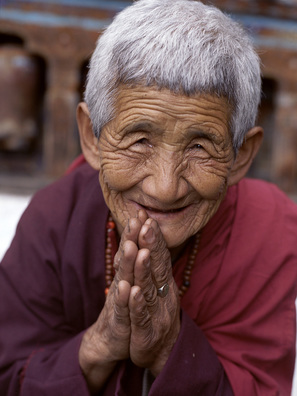Meditation

My first yoga teacher, Erich Schiffmann, imparted on me the importance of a daily meditation practice. He taught me that meditation is the source and origin for the highest forms of creativity and clarity. If there is any single piece of advice I could give, it is to meditate every day even just for five minutes.
Meditation helps you be present, and being present makes you aware of what happens moment-to-moment. When we meditate, it helps us notice and perceive more of what is happening. It is the key to seeing clearly and keeping the information flowing in fresh ways. So often, we actually know far more than we think we do. It's just trapped and blocked beneath layers of stuff -- stress, thinking, conditioning, misperceptions. So often in daily situations we can find ourselves struggling to find the right words, feel anxious and confused, or so nervous that we become control freaks who police ourselves and our loved ones. Confusion can roll in like fog and obscure our thoughts, or intercept our ability to communicate clearly, like static interference on the line. When the free flow of information is interrupted, we’re less available to act with compassion, skill, awareness and confidence. Meditation clears the fog and static. It also frees our creative potential so we can live with greater enthusiasm and innovation.
A renown Chinese historian named John King Fairbank wrote in his last book, “China: A New History,” that our “libraries are littered with the pronouncement of writers who knew all about China but could not see how much they did not know. The expansion of our knowledge has expanded the circumference of our ignorance.” This is very true about life. When we are too certain about what we know, we risk being overconfident and close down our curiosity and openness. Meditation helps show us the interplay of what we know and the object of our knowing, which is infinite and vast. By watching and observing what happens in our experience, we foster the capacity to begin listening to and responding from a place that’s free from our mental fluctuations.
While there are many ways outlined by in the texts to move past these obstacles, meditation remains a central and key practice. In the Buddhist tradition, it is equally central as a means of liberating us from unskillful habit patterns, reactivity or doubt. In Daoism, meditation calms the mind and body, allowing us to enter into states of greater tranquility and reflection. In all traditions, it's what helps the wild and unpredictable mind expand and be freer to experience all that life unfolds.
My lineage and teachers
Erich Schiffmann was my first meditation teacher, who set me on a path of my daily sitting practice in over twenty years ago. I now teach Insight Meditation, and am authorised to teach by long-time Dhamma teacher, Martin Aylward. I am also deeply grateful to the teachings of Ajahn Sucitto, who has helped me make qigong and Dhamma teachings one unified home.
Meditation helps you be present, and being present makes you aware of what happens moment-to-moment. When we meditate, it helps us notice and perceive more of what is happening. It is the key to seeing clearly and keeping the information flowing in fresh ways. So often, we actually know far more than we think we do. It's just trapped and blocked beneath layers of stuff -- stress, thinking, conditioning, misperceptions. So often in daily situations we can find ourselves struggling to find the right words, feel anxious and confused, or so nervous that we become control freaks who police ourselves and our loved ones. Confusion can roll in like fog and obscure our thoughts, or intercept our ability to communicate clearly, like static interference on the line. When the free flow of information is interrupted, we’re less available to act with compassion, skill, awareness and confidence. Meditation clears the fog and static. It also frees our creative potential so we can live with greater enthusiasm and innovation.
A renown Chinese historian named John King Fairbank wrote in his last book, “China: A New History,” that our “libraries are littered with the pronouncement of writers who knew all about China but could not see how much they did not know. The expansion of our knowledge has expanded the circumference of our ignorance.” This is very true about life. When we are too certain about what we know, we risk being overconfident and close down our curiosity and openness. Meditation helps show us the interplay of what we know and the object of our knowing, which is infinite and vast. By watching and observing what happens in our experience, we foster the capacity to begin listening to and responding from a place that’s free from our mental fluctuations.
While there are many ways outlined by in the texts to move past these obstacles, meditation remains a central and key practice. In the Buddhist tradition, it is equally central as a means of liberating us from unskillful habit patterns, reactivity or doubt. In Daoism, meditation calms the mind and body, allowing us to enter into states of greater tranquility and reflection. In all traditions, it's what helps the wild and unpredictable mind expand and be freer to experience all that life unfolds.
My lineage and teachers
Erich Schiffmann was my first meditation teacher, who set me on a path of my daily sitting practice in over twenty years ago. I now teach Insight Meditation, and am authorised to teach by long-time Dhamma teacher, Martin Aylward. I am also deeply grateful to the teachings of Ajahn Sucitto, who has helped me make qigong and Dhamma teachings one unified home.
